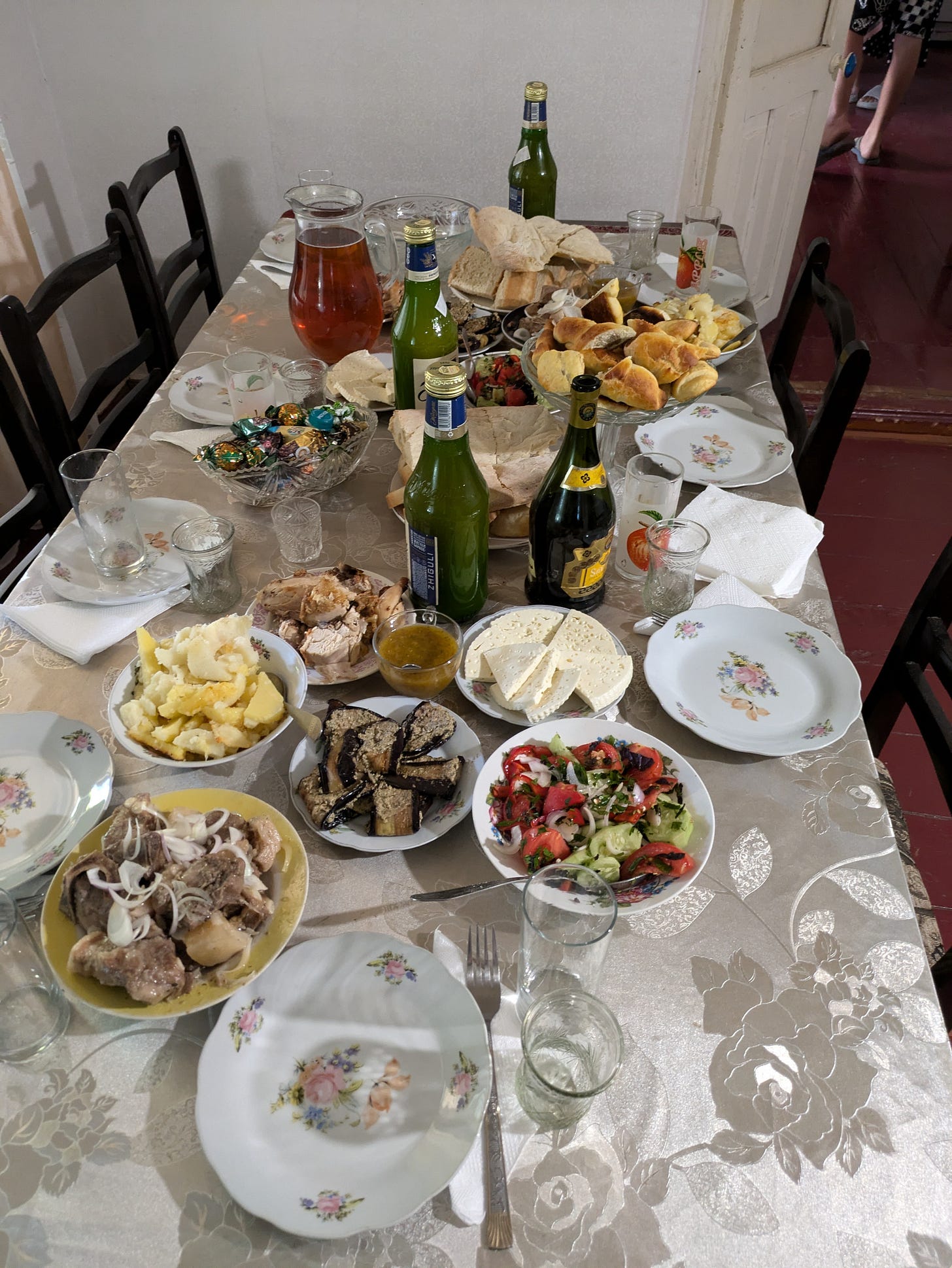Postcards from Georgia: Batumi-Gorgadzeebi-Dgvar + September Coaching Invitation
Eyeball stretching, citrus groves, and Dave's Aunt Nellie
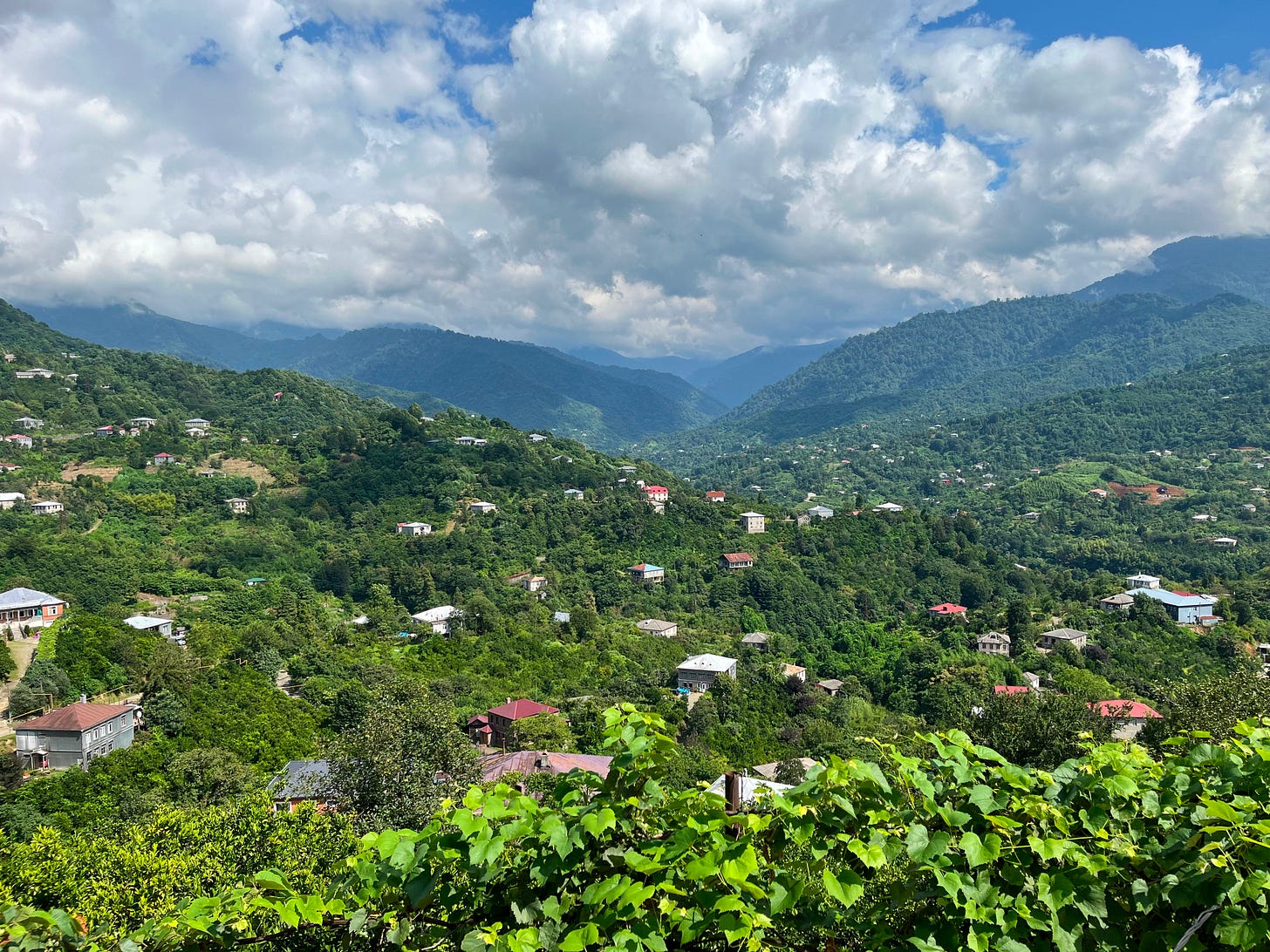
September coaching for paid subscribers is Friday, September 27, at 9 am EDT. Zoom link after the paywall. Ready to join us?
Please note this supersized post might be truncated in email. Click “Read entire message” to read the full story!
Ok, yeah, I know I’ve been home for a month. Let’s just say this postcard got delayed in the mail. Or in the way stations of my brain. Sorry about that.
When you last got a postcard from Georgia, I had lost my new glasses in the Black Sea at Kobuleti and was consoling myself with Bela’s wonderful Adjarian khachapuri. It worked wonders.
[I will definitely share her khachapuri recipe after I test it in non-bakery quantities. In the meantime, of all the khachapuri recipes I tried during our marriage, my late husband approved of this one from Chef John of Food Wishes (except you don’t need so much cheese!)]
The next day we needed to find a solution to my blindness. At that point we had a week left of our visit and me being guided the rest of the trip was not an option. First, we went to a local drug store, where everyone seemed confused that a pair of reading glasses didn’t fix my issue.
(Yes, of course I need reading glasses. But I was nearsighted with severe astigmatism before I was middle aged.)
Batumi, Adjara
So we went in to an optical shop in Batumi, accompanied by Bela’s ever-helpful English speaking son.
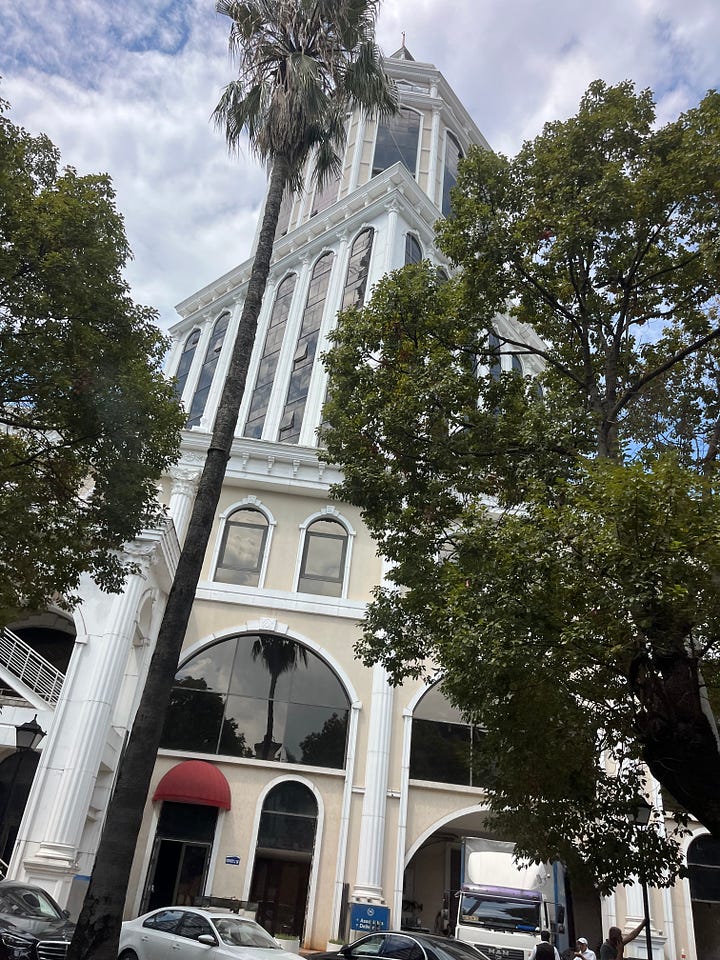



The simplest solution was disposable contacts – and they had them available in something close to my prescription.
As I go into this story, I want to say in my defense that I’ve worn gas permeable hard contacts since I was 12 and have no trouble with them. Given my astigmatism, my optometrists have never recommended soft contacts.
I put on the left one on my second try.
The right one was a challenge.
I tried and tried and tried, and eventually got it in. But then it move to the edge of my eye. I tried to move it over, just as you would with hard contacts, but it wouldn’t budge.
The shop assistant was willing to try and shift it, but unwilling to remove it because she was wearing long acrylic nails. Both assistants were, actually, as if it were a dress code.
People who work in professions where they might have to stick their fingers in your eyes should not have long nails.
She could not get it to budge.
10 minutes into this process they were ready for us to leave. I know I was causing a spectacle. But I was stubborn. I was sure I could make it work.
If you’re used to hard contacts, which we pop out using our eyelids, soft contacts are weird. You have to pinch them out.
I was trying that when Bela’s son, our translator, started to faint.
I was immediately worried that he was an undiagnosed diabetic, because I’ve known several kids where that has been the case. I insisted he get a thumb pick at the mall pharmacy to make sure he was ok.
Luckily, he wasn’t diabetic, just seriously grossed out, which hadn’t even occurred to me because I couldn’t see myself in the mirrors.
We brought in my middle son, who wears soft contacts. He removed it and then put it in for me.
Once again, the contact shifted to the edge of my eye.
Assistant tried to move it. Son tried to move it. I tried to move it.
I had suctioned it to my eye, which had been red and swollen for awhile.
The other advantage of hard contacts is they are colored. You can spot them on the floor or countertop or in your eye if they aren’t where they’re supposed to be. Soft contacts are entirely clear.
So my son got to work trying to remove the completely stuck contact.
He missed and pinched my eyeball instead.
Did you know that eyeballs stretch when pinched?
Well, now you do. (Sorry about that.)
Much to the relief of the shop assistants, I decided I’d spend the next week+ while traveling wearing a left contact and not a right. Which meant everything was a bit catawampus.
But it worked fine.
And lesson learn. Now I’ll always bring backups when I travel.
Gorgadzeebi, Adjara
We then travelled to my sister-in-law Maia’s family farm in Gorgazeebi, Adjara, a village where most everyone in the area is a Gorgiladze. Indeed, Gorgadzeebi is named after the Gorgiladzes.
4 asides for cultural context:
Gorgiladze is an entirely different name from my family’s name of Gogoladze. Georgians would not think of them as similar.
In Georgia, women do not take their husband’s name. After I left academia, when I suggested to David that maybe I should change my name from Cain to Gogoladze, he looked at me like I was was crazy. It didn’t make any sense to him. And, as he said, “it’s not like you pronounce it correctly anyway.”
So there might be men and children with different last names in the vicinity, but their wives/mothers are Gorgiladzes.
Georgians are remarkably hospitable, and will give their guests a marvelous feast and the best room, regardless of when we show up.
Gorgadzeebi is in the mountains outside of Batumi. Nearly everyone there grows citrus, and further away there are still some tea farmers, although sadly tea is no longer economically viable. In the Soviet Union, Adjara, Georgia provided the citrus and tea supply and much of the produce.
Maia’s mother, Manana Gorgiladze, Maia’s brother Jemal, his wife Rusico, their teenage son
(aka Anri, depending on transliteration) and their young daughter, grow 2000 mandarian trees, at least 100 lemons, and a large range of other fruits and vegetables.Once we arrived, Bela’s son happily handed off his translation duties to Anri. We had some wonderful conversations and he provided most of the information about Gorgadzeebi.
The Gorgiladzes also raise bees for honey and pollination. Here’s a video of the hives, taken by Anri, who (smartly) did not want me wandering around on his steep terraces and kindly took photos and videos for me:
They have a beautiful old farmhouse, built to catch the breezes in the summer, with a lovely wrap around porch with a view of the surrounding mountains. It is astonishingly beautiful.
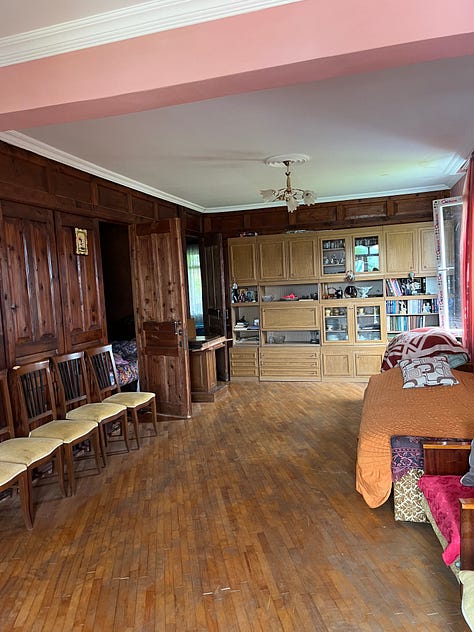

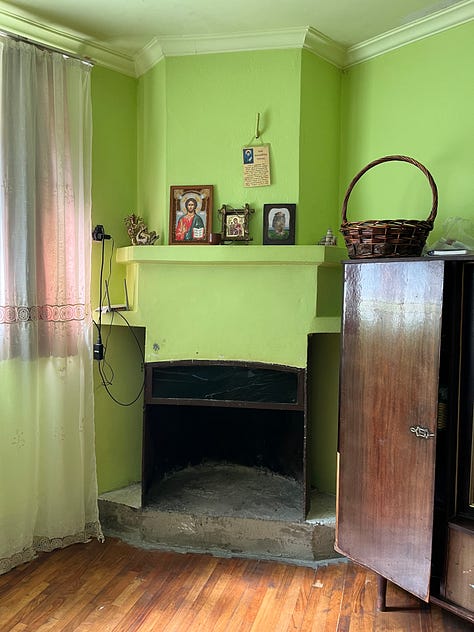
This video by Anri starts with a peach, and then shows some of the beautiful mandarins and the view.
The Gorgiladzes gave us such a warm welcome and so much delicious food. And it was beautifully plated too. I’m sorry I didn’t take any pictures of the food. I was far too busy eating and revelling in the flavors.
For years, I’ve made Georgian food using cookbooks and adjusted based on Dave’s responses. But it is not the same as tasting homemade food by an excellent cook, made with homegrown produce and local spices. Much of the trip was one revelation after another as I thought, “oh, that’s what he meant.”
I’ve asked Manana for recipes (via Anri). I will share them if allowed.

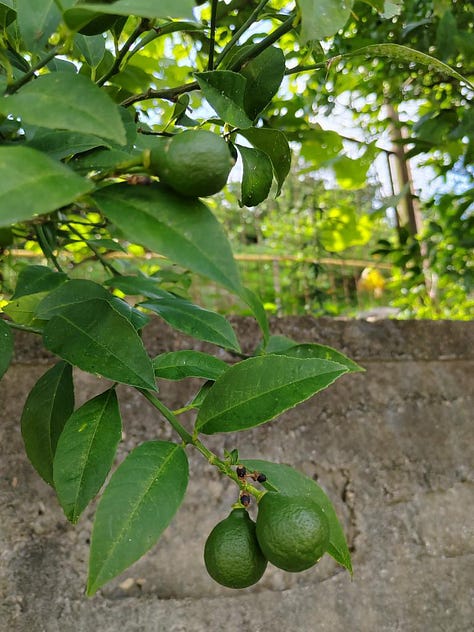


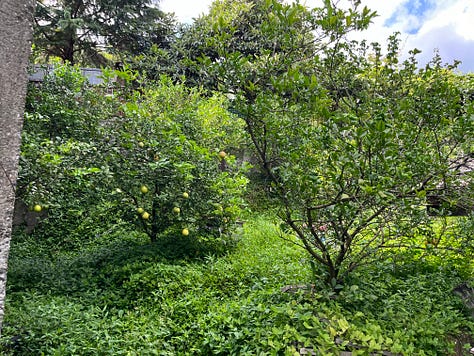

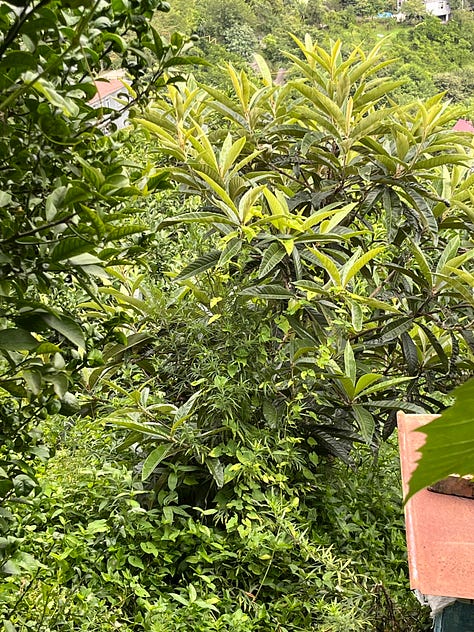

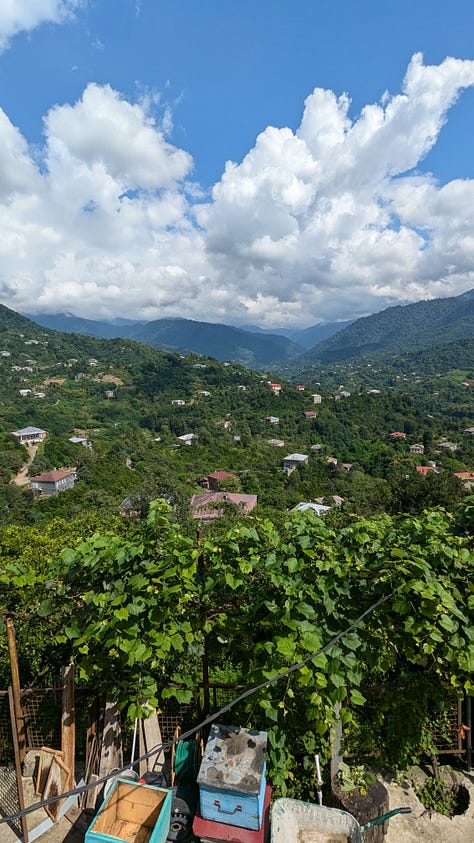
The photo you’re missing out on is of Anri and my middle son, who are not blood relatives but look amazingly like brothers, much more similar than their other cousins. I don’t post pictures of my children or other children (even if they’re nearly adults), so you have to take my word on it.
The next morning was my youngest son’s 11th birthday. Bela brought his favorite walnut pastry from her bakery in Batumi and they presented it to him, complete with candle and boisterous singing. It is a wonderful memory.
Dgvar, Borjomi
Next we travelled to Dgvar, the ancestral village of the Gogoladzes, in central Georgia. The Borjomi region is famous for its healing hot springs. You may have seen Borjomi water available in your grocery store. So before arriving at our relatives in Dgvar, we stopped at the baths. I was expecting protected pools, some variation of the hot springs baths I’ve enjoyed near Santa Fe, New Mexico and Jasper, Alberta. That is not what I found.
Maia and I were startled to find a man in the women’s bath and we had to wait awhile until he finished. After the boys returned from the men’s bath I understood why.
The women’s bath in Dgvar is pleasantly warm.
The men’s is not.
We continued up the mountain road to the home of David’s Uncle Vasili Gogoladze and Aunt Nellie. They, too, have a lovely old farmhouse that was built to capture the breeze in the summer.





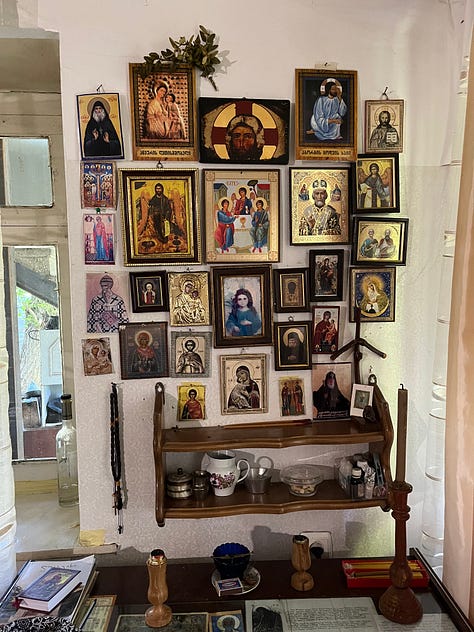
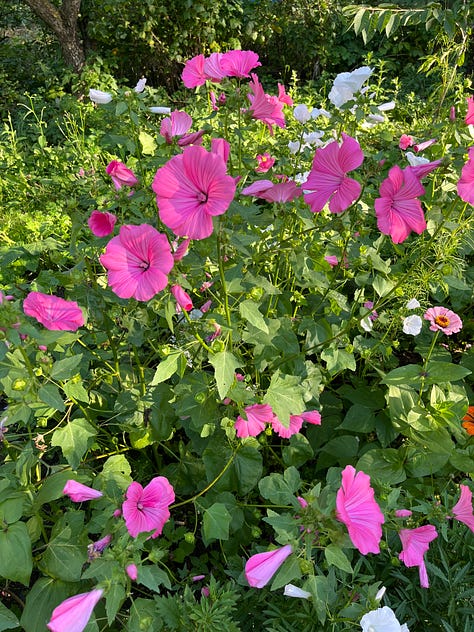


Like many Soviet children, Dave spent much of his early years with his grandmother, whose house and alucha tree are still going strong. Alucha (Prunus vachuschtiiis), the sour cherry plum native to the Caucasus region, is the source of the green tkemali sauce. We spent years trying to get one in Canada so I was thrilled to eat the fruit from the one that was central to Dave’s memories.
Everyone in the valley is a Gogoladze, and everyone in the vicinity is a close relative, and Dave had great memories of running from one house to another, from his grandmother to visit aunts and uncles and cousins.
We met Uncle Vasili, David’s father’s brother, who was a chef. Aunt Nellie was a school principal and the school superintendent.
Uncle Vasili taught Dave to appreciate food – which matters to me in part because we met when he was my cheesemonger.
Dave always spoke of Aunt Nellie and her home and garden with such fondness – she taught Dave to garden. And she secured his visa when he left for North America. We are so grateful to her.
They prepared a beautiful supra and Dave’s cousins in the area came to join us and meet his sons.
A supra is a traditional Georgian feast, with toasts led by a tamada (toastmaster). My teens were treated as men during the feast, and given alcohol. They poured fresh peach juice for my youngest. The wine you see in the pitcher on the table is made in the traditional Georgian way, buried in qvevri (earthern vessels). It is orange from the prolonged contact of the white grapes with their skins. This type of natural wine has once again become popular in the West – we call it orange wine. They also had sparkling wine, which was especially delicious. In a supra, you’re expected to empty your (very small) glass of wine or other alcohol after each toast. Ladies are allowed to sip.
It was a wonderful meal and a moving experience.



After dinner we went exploring in the area. One of Dave’s cousins stopped some older boys who were walking by with a pony. “Let them have a ride,” he said.
I leaned over to an English speaking cousin and asked who the boys were. “Some cousins,” she said.
“Do you know them?” I asked.
“No.”
“Then how do you know they’re cousins?” I asked.
“We’re all Gogoladzes here,” she said.
The boys said, “Yes, we are Gogoladzes too.”
Then they had a rapid conversation while the younger kids were riding the pony, establishing how they were related.
That night, as we settled in at Aunt Nellie’s house, some cousins came by to pick up my boys to hang out for a few hours.
They’ve grown up in Canada, without family. They’re a little amused and overwhelmed to meet so many people at once who are family. But it was a thrilling and fun experience for them.
As we hugged them goodbye the next morning, I knew it was unlikely we would see Uncle Vasili again. He was fragile.
Uncle Vasili died shortly after we returned home. I’m so glad we got to spend time with them on our trip. I’m so grateful they got to meet David’s boys.
Postcards from our trip through Georgia 🇬🇪
Helpful workshops and posts about the moon and equinox
Fall equinox is a powerful time to let go of what’s holding you back. Spring equinox is for calling in all your desires.
August workshop and coaching
My friend and subscriber Athena is offering special 20 minute horoscope readings for the eclipse season! Don’t miss out!
Our September Group Coaching is THIS FRIDAY, September 27, 9:00-10:00am EDT
Although the coaching calls are for paid subscribers and members only, I am currently accepting questions from my readers and the public as well. I’ll respond with brief videos available to all, or, if it’s something that requires deeper work, in the group coaching sessions.
You can submit questions anonymously here
Find the open thread here:







